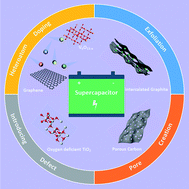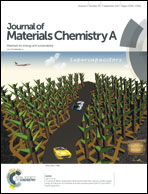Recent advances in chemical methods for activating carbon and metal oxide based electrodes for supercapacitors
Abstract
Carbon and metal oxides are considered as the two most important categories of electrode materials for supercapacitors. To date, significant progress has been made in the synthesis of different carbon and metal oxide based electrodes. However, the limited ion accessible area of many carbon materials, poor electrical conductivity of most metal oxides, and sluggish ion diffusion in the bulk carbon or metal oxide materials are major barriers for these electrodes to achieve high energy density and power density simultaneously. In the past decade, numerous activation methods have been demonstrated to overcome these limitations. In this review, we summarize the recent advances in chemical methods for activating carbon and metal oxide electrodes for supercapacitors, including heteroatom doping, increasing porosity, introducing oxygen vacancies, and chemical exfoliation. The fundamentals of these methods are discussed and exemplified. We also discuss the challenges and opportunities of different activation methods.

- This article is part of the themed collection: Recent Review Articles


 Please wait while we load your content...
Please wait while we load your content...